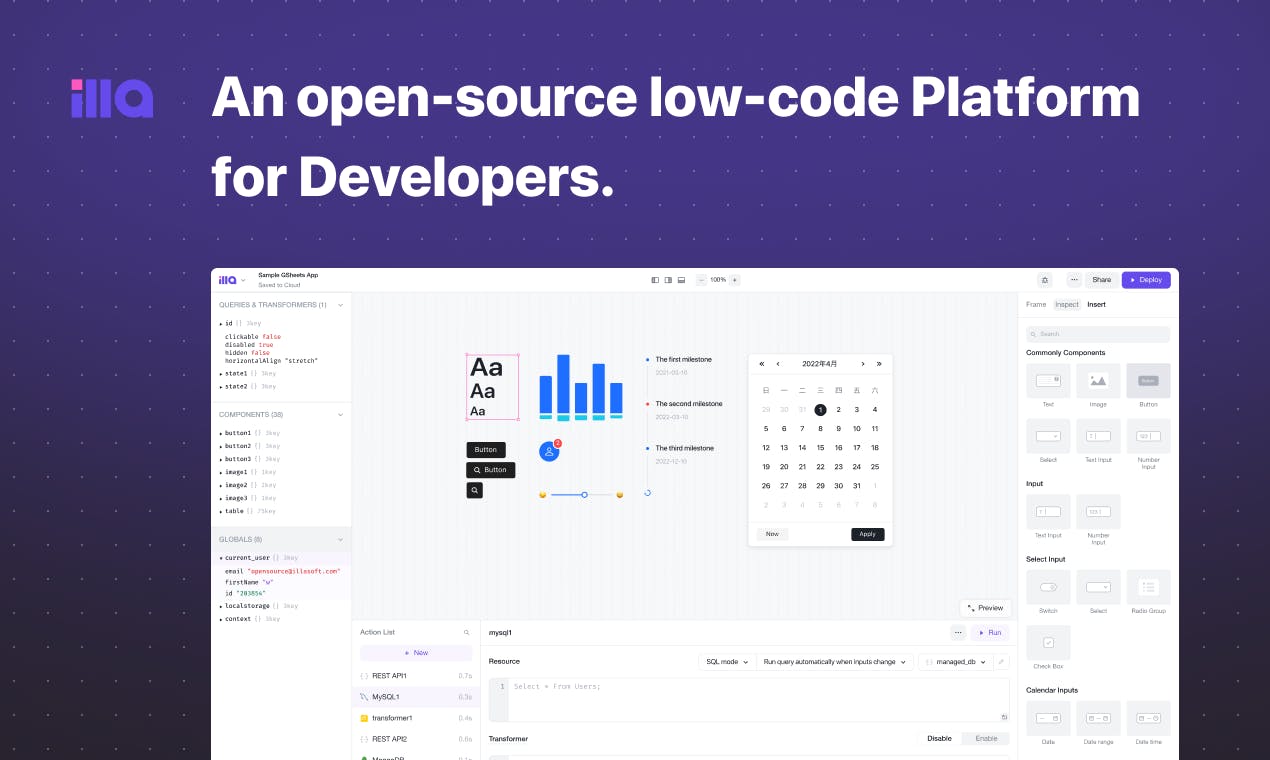Retool vs Tooljet: Comparing Two Powerful Low-Code Platforms for Internal Tools
 ILLA Cloud
ILLA Cloud
Introduction
The demand for efficient and easy-to-use internal tools is on the rise, and low-code platforms have emerged as the go-to solution for businesses looking to streamline their internal processes. Retool and Tooljet are two popular low-code platforms that have attracted attention for their ability to build internal tools with ease. In this blog, we'll compare Retool and Tooljet, exploring their key features, use cases, and performance, and introduce ILLA Cloud as a supporting platform for app development and deployment.
Retool

Retool is a widely-used low-code platform that makes it easy to build custom internal tools, including SQL GUIs and Airtable dashboards. With its extensive integration capabilities, Retool allows users to connect to various databases and APIs, making it a popular choice for developing Redis UIs and Airtable admin panels. Retool offers both self-hosted and cloud-based solutions, making it a flexible option for businesses of all sizes. However, some users may find Retool's pricing a bit steep, which has led to a search for open-source Retool alternatives.
Retool's key features and use cases:
Extensive Integration Capabilities: Retool supports a wide range of databases and APIs, such as SQL, Redis, and Airtable, making it a popular choice for developing Redis UIs, SQL GUIs, and Airtable admin panels.
User Interface and Experience: Retool features a drag-and-drop interface, which enables users to build internal tools without extensive coding knowledge. The platform also provides a range of pre-built components, such as tables, forms, and charts, to speed up the development process.
Customizability: With Retool custom components, users can create bespoke solutions tailored to their specific needs. This feature allows for greater flexibility and control over the appearance and functionality of internal tools.
Security and Compliance: Retool offers robust security features, including role-based access control, audit logs, and SSO. In addition to its cloud-based solution, Retool's self-hosted and on-premise options provide businesses with even more control over their data and infrastructure.
Pricing: Retool offers a range of pricing plans, but its relatively higher costs may lead some users to search for more affordable open-source Retool alternatives.
Tooljet

Tooljet is another powerful low-code platform that enables users to build and deploy internal tools and software quickly. Like Retool, Tooljet offers a wide range of integrations, making it easy to create GUIs for Redis and MySQL, as well as handle Redis queries. Tooljet's open-source nature makes it an appealing choice for businesses looking for Retool alternatives. In addition to its ease of use and customizability, Tooljet offers a secure and compliant environment for developing internal tooling, with features like SSO and Docker support.
Tooljet's key features and use cases:
Integration Capabilities: Like Retool, Tooljet offers a wide range of integrations, allowing users to connect to various databases and APIs, such as SQL, Redis, and Airtable. This makes it easy to create GUIs for Redis and MySQL and handle Redis queries.
User Interface and Experience: Tooljet provides an intuitive interface with a drag-and-drop builder, making it easy for users to create and customize their internal tools. It also includes a rich library of pre-built components to facilitate rapid development.
Customizability: Tooljet's open-source nature allows for greater customization and flexibility than Retool. Users can modify the source code and contribute to the platform's development, ensuring that their internal tools align with their unique requirements.
Security and Compliance: Tooljet prioritizes security, offering features like SSO, Docker support, and role-based access control. This ensures that your internal tools remain secure and compliant while using Tooljet.
Pricing: Tooljet's open-source model is free to use and modify, making it an attractive and cost-effective alternative to Retool, especially for smaller businesses or those with limited budgets.
Comparing Retool and Tooljet
When comparing Retool and Tooljet, several key factors come into play:
Integration Capabilities: Both platforms offer extensive integrations, allowing users to connect to various databases and APIs, including SQL, Redis, and Airtable. While both platforms excel in this area, your choice may depend on specific integration requirements or preferences.
User Interface and Experience: Retool and Tooljet both provide intuitive drag-and-drop interfaces and a library of pre-built components, making it easy for users to build internal tools like Google internal tools and Airtable dashboards. Personal preferences and ease of use will play a role in determining the best option for your needs.
Customizability: Retool offers custom components, while Tooljet's open-source nature allows for even greater customization. Consider the level of customization required for your internal tools when choosing between the two platforms.
Security and Compliance: Both platforms prioritize security, with Retool providing self-hosted and on-premise options, while Tooljet offers SSO and Docker support. Evaluate your organization's specific security and compliance requirements when making a decision.
Pricing: Retool's pricing may be a barrier for some users, while Tooljet's open-source model offers a more budget-friendly alternative. Consider your organization's budget and financial constraints when selecting the most suitable platform.
Retool vs Tooljet - Choosing the Right Low-Code Platform for Your Needs
To choose between Retool and Tooljet, consider the following factors:
Integration Requirements: Both platforms offer extensive integration options, so your choice may depend on specific needs or preferences. Evaluate which platform best supports the databases and APIs essential to your internal tools.
Customizability: If custom components are a priority, Retool may be the better choice. However, if you prefer an open-source platform with greater flexibility, Tooljet could be more suitable.
Security and Compliance: Both Retool and Tooljet offer robust security features, so consider your specific compliance requirements when making a decision. Assess which platform best aligns with your organization's security policies and standards.
Budget: If you're searching for a cost-effective solution, Tooljet's open-source model may be more appealing than Retool's pricing structure. Take into account the long-term costs associated with each platform, including potential updates and maintenance.
ILLA Cloud: The Best Alternative To Retool And Tooljet

ILLA is a low-code development platform that allows developers to create internal tools in minutes and save time on website design. The drag & drop interface makes creating applications much easier. Both professional developers and citizen developers don't need to do hand coding and they can do rapid application development to boost business processes.
ILLA Cloud is a leading cloud service provider that can support the use of Retool or Tooljet for app development and deployment. With key features like scalability, security, and cost-effectiveness, ILLA Cloud enables businesses to build and deploy internal tools more efficiently.
ILLA Cloud also offers comprehensive support and resources to ensure a seamless experience when working with Retool or Tooljet. By choosing ILLA Cloud as your cloud service provider, you can leverage the following benefits:
Scalability: ILLA Cloud's scalable infrastructure allows your internal tools to grow and adapt as your business needs change.
Security: With robust security measures in place, ILLA Cloud ensures that your data and applications remain safe while using Retool or Tooljet.
Cost-effectiveness: ILLA Cloud's flexible pricing model enables businesses to optimize their resources and reduce costs.
Support and resources: ILLA Cloud provides dedicated support and resources to help you navigate the complexities of building and deploying internal tools with Retool or Tooljet.ILLA is unlike any other low-code development platform with its unique and innovative features. Here are some features that make ILLA different from others:
Made For Developers
We provide developers with a lot of leeway when it comes to implementing greater functionality with JavaScript.We have achieved it by encapsulating JS statements with Template Syntax to add variable spaces at any string type for more diversity in the output.
Easy Integration With Data Source
ILLA can connect to popular databases via APIs and chain actions to user events. It strongly links front-end components and back-end data.This allows developers to write simple data calls to accomplish huge information. Features like this are very important for low-code platforms.
Collaboration Between Developers
ILLA translates ideas into real-world designs. Developers can work in ILLA builder at the same time by using the link-sharing feature.They can also interact with other developers in real-time to provide quick feedback. This considerably improves development capability.
Rich UI Library
The UI library of ILLA is unlike that of any other low-code platform. It’s full of unique materials and components to fulfill the needs of any developer.ILLA Builder has hundreds of components designed to fulfill the demands of developers in many circumstances. Drag and drop allows users to increase productivity while saving time.
Conclusion
In summary, both Retool and Tooljet offer powerful solutions for building internal tools, such as SQL GUIs, Redis UIs, and Airtable dashboards. While Retool excels in custom components and offers self-hosted and on-premise options, Tooljet's open-source nature provides greater flexibility and cost-effectiveness. Ultimately, the choice between Retool and Tooljet depends on your specific needs, priorities, and budget.
ILLA Cloud serves as an excellent supporting platform for both Retool and Tooljet, providing scalability, security, and cost-effectiveness to help you build and deploy internal tools more efficiently. By choosing ILLA Cloud, you can ensure a seamless experience while using these powerful low-code platforms.
Join our Discord Community: discord.com/invite/illacloud
Try ILLA Cloud for free: cloud.illacloud.com
ILLA Home Page: illacloud.com
GitHub page: github.com/illacloud/illa-builder
Subscribe to my newsletter
Read articles from ILLA Cloud directly inside your inbox. Subscribe to the newsletter, and don't miss out.
Written by

ILLA Cloud
ILLA Cloud
Refactor everyone's work. Official Website: http://illacloud.com GitHub Repo: http://github.com/illacloud/illa-builder